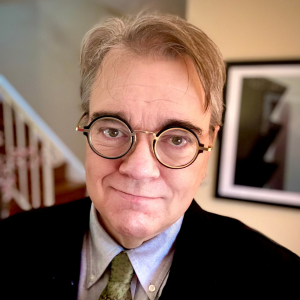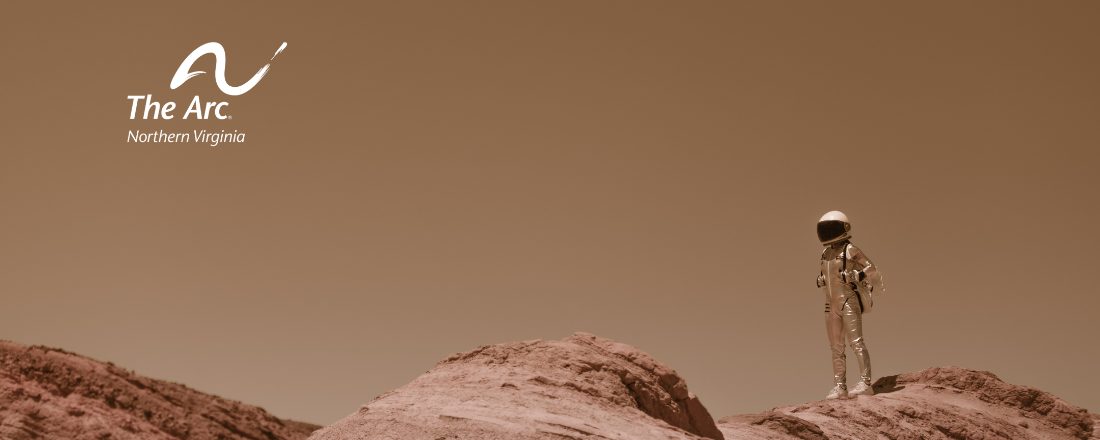
Rob Hudson is a Frank Trippett Advocacy and Outreach Fellow, and Community Outreach Associate for The Arc of Northern Virginia. Rob’s advocacy on behalf of his daughter, Schuyler, who has a rare disorder called polymicrogyria, has guided his personal philosophy for the past twenty years.
Astronauts
Like countless other parents of people with intellectual and developmental disabilities, the years since my daughter’s diagnosis have been dominated by advocacy. It took many forms over the years, as it does for most of us. Advocating for answers to her mysterious impairment and for the life-saving medical care she needed early on; advocating for the assistive technology that gave her a voice, as well as her place in inclusive classrooms and social spaces; and of course advocating for her future, for an adult life which I could hardly imagine but which she deserved to have in all its fullness and fairness.
We learned quickly that we weren’t alone, which was good because we never could have done it all by ourselves. My daughter had a tenacious spirit and the desire to succeed, but she didn’t have the tools or the opportunities, not on her own and not even just with our hard work. She needed a team.
When I consider my daughter’s journey and those of the thousands of young adults with disabilities like her, I think of astronauts.
Everybody loves astronauts. Why wouldn’t we? Astronauts live extraordinary lives. They peacefully go to amazing places the rest of us can scarcely envision, and they expand our concept of the human experience. I’ve actually had the opportunity to meet a few astronauts in my lifetime, and every time it has been amazing. It doesn’t matter how long ago they went to space or what their lives have looked like since then. There was something transformative about meeting a white-haired, elderly gentleman and politely shaking his hand while imagining him brushing moondust off his boots. Astronauts are cool. That’s just a fact.
The thing about astronauts, however, is they don’t accomplish any of their great feats alone. Buzz Aldrin didn’t go out to his garage and build a rocket so he could go to the moon. We celebrate astronauts because they are brave and smart and adventurous, but we do so with the implied acknowledgement of the many, many people who work tirelessly and creatively to make those adventures happen.
When I began writing this piece, I tried to make a list of all the people who have helped my daughter over the years, going all the way back to the pediatrician who began asking hard questions about her development. I remembered the neurologist who eventually discovered the answer, the doctors who managed her seizures, and the teachers and therapists who set her on her journey with assistive technology. It quickly became clear that I couldn’t even begin to remember them all, which actually kind of astounds me. There are dedicated professionals out there who at one point gave their all to help my daughter, and now they’ve been lost to time and my fuzzy memory. I feel a little guilty abut that, but mostly I’m just impressed at how long that list is.
The success of a person with a disability belongs to that individual first and foremost, and when my daughter finds success, that is her victory more than anyone else’s. It’s certainly not mine; I’ve made plenty of mistakes over the years. If I were the only person standing in my daughter’s own personal Mission Control, her journey would not have been happy or successful. I’ve gotten it wrong before. I’ve failed her many times.
Honestly, it’s not just me, either. She’s also worked with folks who have let her down, sometimes epically. Some were earnest but poorly equipped for the task; others simply didn’t put in the specific work that someone like her requires. It is in these circumstances that I can imagine a lonely and frightened astronaut, cut loose from her tether and floating aimlessly into the darkness of space. When my daughter loses that guidance and that belief in her possibilities, she goes into crisis. It breaks my heart into a thousand pieces.
When it happens, sometimes I feel complicit. I wish I’d been better over the years at seeing those failures before they happened. That has perhaps been my greatest stumble, and the guilt I carry with me isn’t a small burden. I like to think that those who have failed her in her past feel the same, and at least made the commitment to do better next time. My daughter and her friends can be extraordinary teachers if we just bother to listen.
For every person or institution that has ever let her down, however, there have been others whose dedication to their mission and their personal sacrifice have improved the quality of her life immeasurably. She’s had so many believers in her life, believers and even over-believers, which every young person like her needs and deserves. Those who get it right are the ones who look at her and see her potential as well as the particular challenges she presents. They allow themselves to embrace a vision of what her life could look like when she has opportunities and an inclusive environment that allows her the space to be as weird and wonderful as she needs to be.
Sometimes I’ve stood in Mission Control, smartly directing the teams that serve her. At other times, I’ve simply been the guy who climbs up with a squeegee and cleans the bugs off the windshield of her spaceship. I’ve learned that both those jobs are pretty important for her success. I see now how important it is to get them right, and how critical it is for all of us to surround our disabled loved ones with a team that is truly committed.
As much fun as this astronaut metaphor is, however, I also recognize the one crucial junction where it breaks down. Astronauts are great, but they don’t plan their own missions. In that respect, we can hope my daughter and her fellow voyagers with intellectual and developmental disabilities are moving into a future where they’ll eventually leave their mission parameters behind and chart their own course into the unknown. Bolstered by the team that worked so hard to get them there, they’ll reach the stars under their own guidance, and their success will belong to them most of all.



